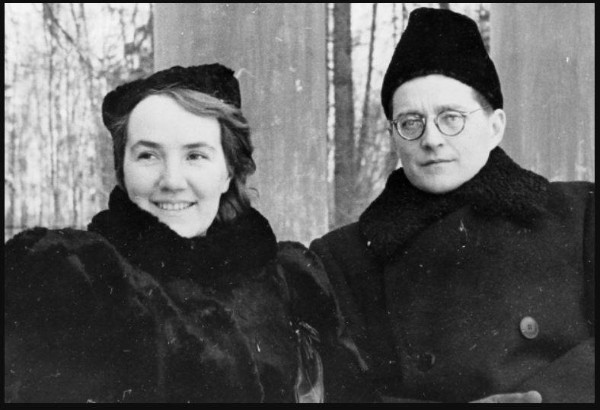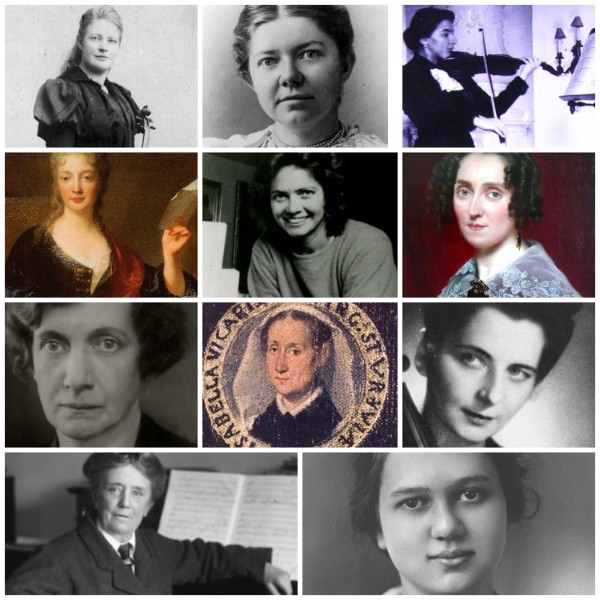Gioachino Rossini was known for his playful, irreverent wit and larger-than-life personality. His music certainly radiated lively exuberance, and it was full of energy and infectious charm that mirrored his zest for life.
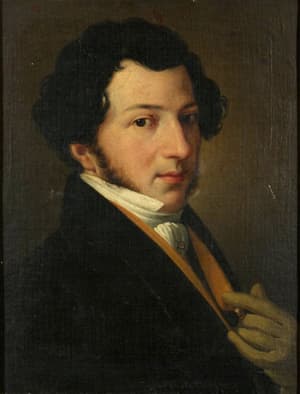
Gioachino Rossini, circa 1815
Rossini was a man of indulgence, known for his love of good food, fine wine, and luxurious living. Despite the immense success of his career, he took a relaxed approach to work, famously retiring from composition at the age of 37. Instead of writing music, he spent his days savouring the pleasures of life and cultivated an enviable reputation as a witty conversationalist and an epicurean.
Around town, he was known for his razor-sharp wit and love of socialising, as he was often the life of the party with his quick humour and lively storytelling. He easily moved around various social circles, forming friendships with artists, writers, and royalty alike.
Rossini certainly had an innate flair for dramatic entrances and clever one-liners, often presenting himself just as confident as the characters in his opera. To celebrate his birthday on 29 February, we thought it might be fun to offer some insights into his personality by exploring 10 of his most famous quotes.
Gioachino Rossini: Wilhelm Tell, “Overture”
“Give me a laundry list and I’ll set it to music”
Let’s get started with one of his most famous and boastful sayings, “Give me a laundry list and I’ll set it to music.” This quote certainly captures the composer’s confidence when it comes to musical talent. Rossini was known to work quickly and with astonishing ease, often creating some of the most beloved and catchy melodies in a matter of hours and entire operas in mere weeks.
It certainly is a statement of confidence in his compositional abilities. In addition, it tells us that his creativity could breathe life into even the most ordinary material. It wasn’t just about composing music, but the joy, energy, and beauty that he could bring to whatever he worked on.
It is also a statement that the inspiration for great music could come from anywhere, even the most unexciting and dull places. Rossini clearly had the ability to take something mundane and transform it into wonderful music. Nothing was too trivial to inspire a great tune.
Gioachino Rossini: La Cenerentola, “Non più mesta”
“I take Beethoven twice a week, Haydn four times, and Mozart every day”
Rossini’s quip, “I take Beethoven twice a week, Haydn four times, and Mozart every day,” is a playful nod to the distinct flavour each composer brings to the musical table. Beethoven, with his brooding intensity and dramatic heft, is like a strong espresso—potent and best savoured in measured doses, while Haydn, the master of wit and structure, offers a lighter, more frequent delight akin to a crisp pastry enjoyed four times a week.
Mozart, however, was his daily bread. Mozart’s refined and balanced style was a key inspiration for Rossini, who admired the effortless clarity and grace of the music.
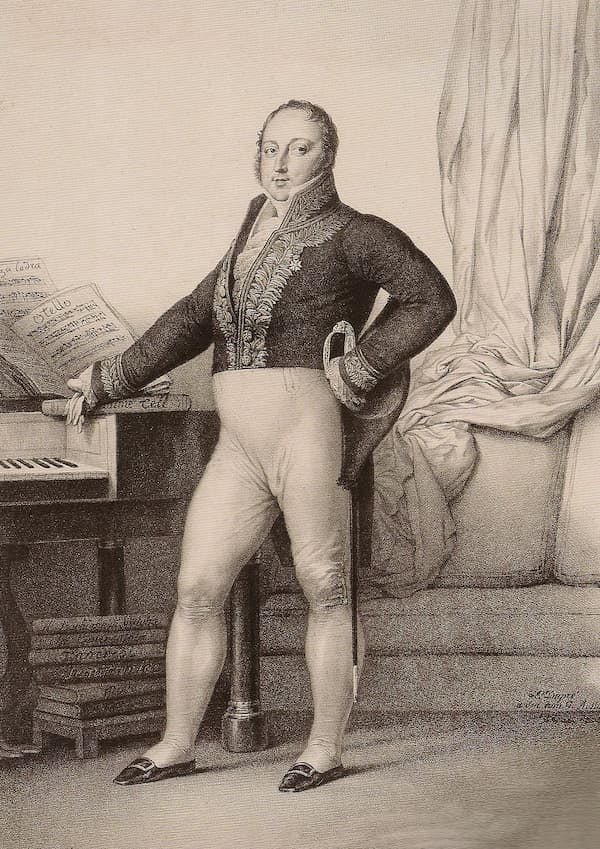
Gioachino Rossini
The quote humorously also reflects his view on the music of these great composers in relation to his own self-awareness as a composer. Beethoven’s thunder, Haydn’s elegance, and Mozart’s perfection are to be consumed in moderation, however, Rossini had his own tunes to spin. It is a playful hierarchy of composers and Rossini’s attempt to place himself within the context of his famous musical predecessors.
Gioachino Rossini: Il Barbiere di Siviglia, “Largo al factotum”
“Monsieur Wagner has good moments but awful quarters of an hour”
In the above quote, Rossini really takes a deliciously sharp jab at Richard Wagner’s operatic style. In fact, he is cutting through the grandeur of Wagner’s work with the precision of a true maestro. The “good moments” do acknowledge the undeniable brilliance in Wagner’s soaring leitmotifs and climactic crescendos.
However, the “awful quarters of an hour” rather brutally refer to Wagner’s tendency to stretch emotions and musical themes far beyond what Rossini thought necessary. At the heart of the quote is a clash of musical aesthetics, Rossini’s brisk and effervescent style versus Wagner’s monumentality.
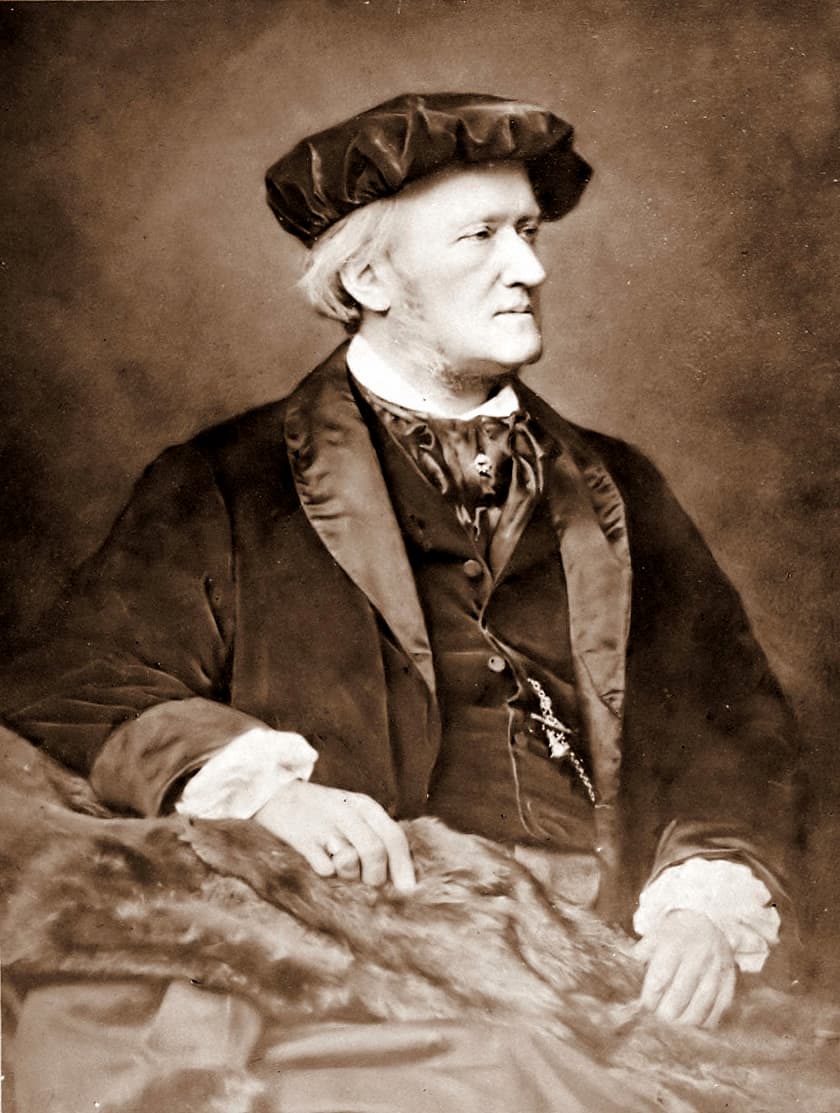
Richard Wagner
Rossini was the undisputed champion of the light-footed bel canto charm, and he just couldn’t resist poking fun at Wagner’s heavy Teutonic sprawl, akin to endless “philosophical lectures set to a tuba.” Rossini was the master of succinct and memorable melodies, and he really never came to terms with the weighty philosophical Wagnerian drama that could feel like a musical marathon.
Gioachino Rossini: Semiramide, “Ah! Quell Giorno ognor rammento”
“One can’t judge Wagner’s opera Lohengrin after a first hearing, and I certainly don’t intend to hear it a second time”
Certainly related, Rossini’s witty and pointed remark on Wagner’s Lohengrin serves as a sharp critique of Wagner’s monumental operatic style. Rossini clearly found the opera overly dense and difficult to absorb in a single sitting, with the work demanding more patience than he was willing to invest.
For Rossini, whose operatic works are defined by their melodic clarity and tightly structured forms, Wagner’s style was not only difficult to digest but as a scholar wrote, “also lacked the immediacy and elegance he prized in opera.”
The quote delineates the cultural and artistic divide between Rossini and Wagner, with Rossini’s quote not just a critique of Lohengrin, but as a broader commentary on the perceived excesses of Wagner’s operatic vision. As Joseph Kerman wrote, “Rossini’s quip is, in essence, a playful but pointed reminder of the differing aesthetic ideals that defined these two iconic composers.”
Gioachino Rossini: Le Comte Ory, “Que les destins prospères”
“Every kind of music is good, except the boring kind”
This delightful quote offers a succinct yet revealing insight into Rossini’s attitude towards music and composition. Known for his light and catchy melodies, and that great sense of dramatic flair, Rossini’s works are celebrated for their energy, wit, and accessibility.
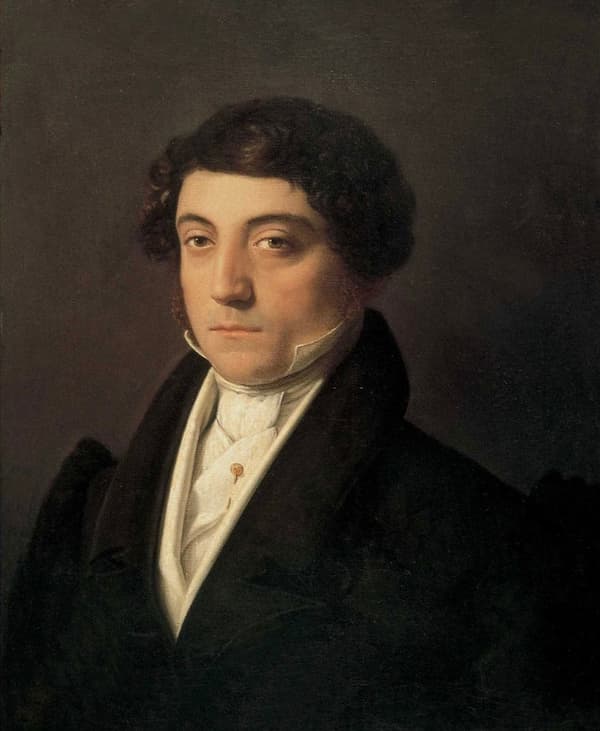
Portrait of Gioachino Rossini
In this particular quote, Rossini does suggest that the ultimate value of music lies in its ability to engage and entertain the listener, regardless of genre or style. Rossini clearly champions music that maintains vitality and charm, rejecting the notion that music should ever feel like a chore to experience.
His dismissal of “boring” music points to an aversion against overly drawn-out, self-indulgent compositions. For Rossini, music should offer both beauty and excitement without ever becoming tedious or overly academic. It is a reminder, that in his eyes, the true essence of music is found in its ability to captivate and move an audience.
Gioachino Rossini: Il Turco in Italia, “Non si da’ follia Maggiore”
“How wonderful opera would be if there were no singers”
In this wonderful quote, Rossini expresses his frustration with one of the most fundamental elements of opera, the human voice. For Rossini, the potential of opera could be fully realised if it weren’t for the limitations of the human voice. He was well aware of the unpredictable nature of live vocal performance, ranging from inconsistent vocal technique to the constraint of the human instrument that could sometimes interfere with the fluidity of his carefully crafted compositions.
However, his remark can also be read as a playful critique of the sometimes excessive focus on vocal virtuosity in opera. His comment may well reflect the ideal of a perfect operatic experience where the music flows seamlessly and without obstruction.
While this is undoubtedly a tongue-in-cheek statement, it expresses Rossini’s desire to elevate the orchestral and musical aspects of opera, perhaps hinting at his broader view that opera’s potential for beauty and drama could be more fully expressed if the attention were less often on the virtuosity and unpredictability of the human voice.
Gioachino Rossini: La Gazza Ladra, “Overture”
“Music is a kind of harmonious language”
This delightful quote encapsulates Rossini’s view of music as an expressive and universal form of communication. For Rossini, music transcended the limitations of spoken language and was able to evoke deep emotional responses through melody, harmony, and rhythm.
In terms of describing music as harmonious, Rossini underscores its capacity to create balance and unity, qualities that were central to his approach to composition. Every note serves a specific purpose in advancing the drama and reinforcing emotions.
Rossini highlights his belief in the universality of music, and by framing music as a language, he suggests that music can bridge cultural divides, creating connections among people from diverse backgrounds. As a scholar wrote, “Rossini’s mastery of melody and form allowed his music to communicate effortlessly with audiences, making his works timeless examples of the power of music as a universal language.”
Gioachino Rossini: Semiramide, “Bel Raggio lusinghier”
“Simple melody and variety in rhythm”
Rossini was known for his skilful use of melody, placing great emphasis on creating accessible, memorable tunes that could resonate with a wide audience. This focus on simplicity allowed his music to be emotionally engaging and immediate, qualities that made his opera stand out for their charm and appeal.
While simple melodies are easy to follow and are highly effective in conveying character, drama, and emotion, Rossini acknowledged that variety in rhythm is a powerful tool in shaping the energy and movement of music.
Rossini’s ability to combine melodic simplicity with rhythmic complexity was a hallmark of his musical style, making his works not only approachable but also musically rich. His rhythmic innovations, the frequent use of syncopation, rapid tempo shifts, and energetic rhythmic patterns contributed to the lively character of his operas. His key to a successful opera was creating music that was both emotionally impactful and full of variety, ensuring that his melodies were memorable and his rhythms kept the energy flowing.
Gioachino Rossini: La donna del Lago, “Tanti affetti in tal moment”
“Eating, loving, singing, and digesting are the four acts of the comic opera known as life”
What a delightful quote that suggests that opera reflects and amplifies the most basic human experiences. Much of his operatic style is rooted in comedy, where the plot often revolves around misunderstandings, romantic entanglements, and humorous situations, with a focus on simple pleasures such as food and love.
Rossini, who was known for his love of food (read more from our article “Food for Thought – Mealtime with Gioachino Rossini”), links the everyday actions of eating, loving, and digesting to the broad themes of human existence, suggesting that these simple, universal activities are as much a part of life’s drama as the more elevated or dramatic moments.
Rossini’s opera often blends the everyday with the sublime, turning the trivial into something universal and timeless. As such, life like opera, is a performance filled with joy, challenges, and moments of deep and frequently humorous expressions.
Gioachino Rossini: La Cenerentola, “Si, ritrovarla io giuro”
“Rossini would have been a great composer if his teacher had spanked him enough on his backside”
This remarkable quote comes from none other than Ludwig van Beethoven. The two composers actually met in Vienna in April 1822, and the interaction was supposedly cordial. Rossini writes, “In Vienna I attended for the first time the performance of one of his symphonies, the Eroica. That music overwhelmed me. I had a single thought, to know that great genius, to see him, just once.”
Salieri arranged the visit, and Rossini was taken aback by the miserable dwelling the great man inhabited. “There was an indefinable sadness that emanates from his face, while under the thick eyebrows, as in deep caverns, the eyes, even if small, seem transfixed.”
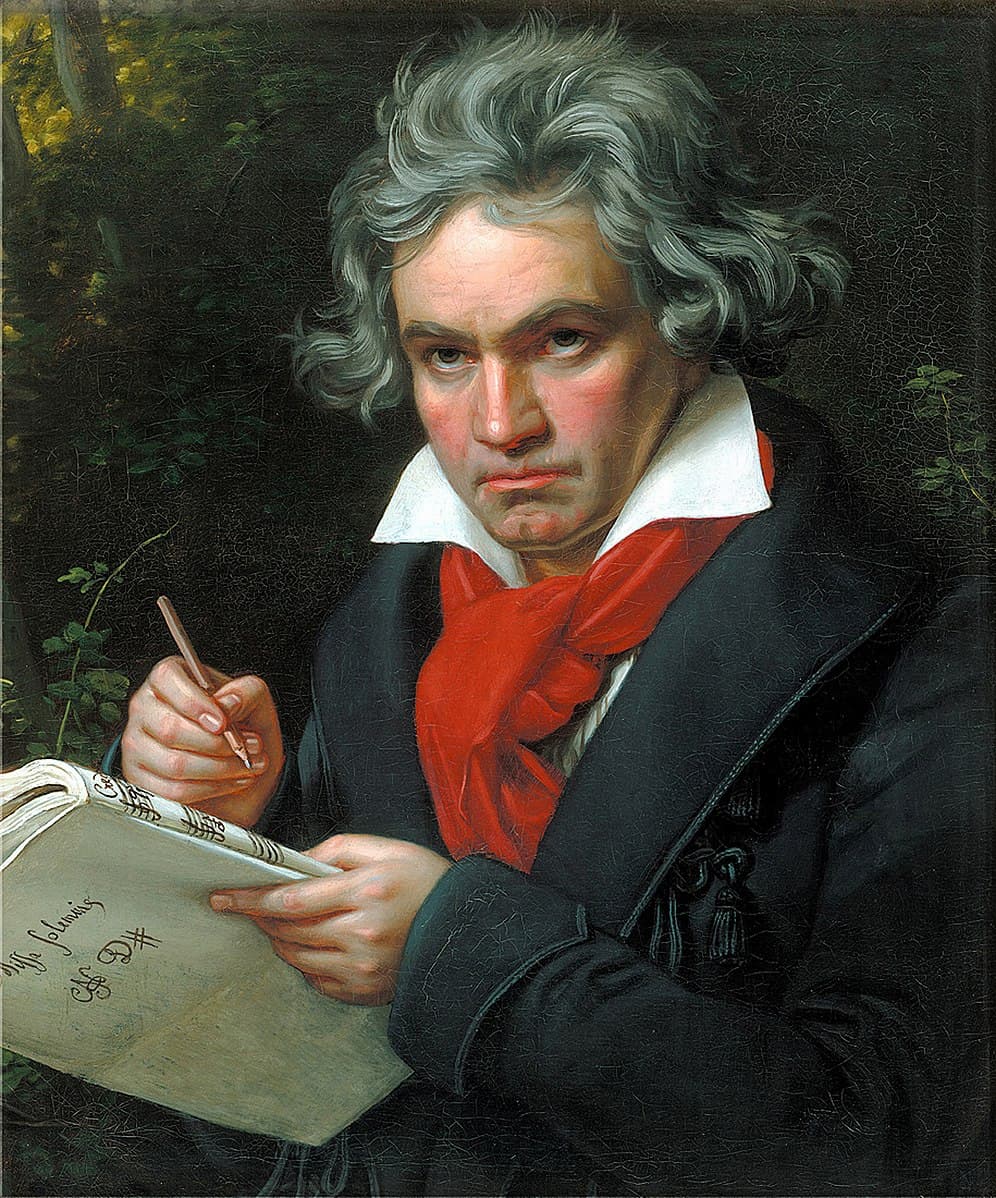
Portrait of Ludwig van Beethoven
Beethoven, in turn, was intensely jealous of Rossini’s popularity, and he could never fully come to terms with the fact that Viennese audiences were swept away by Rossini’s melodies. As he told a friend, “Rossini is a talented and melodious composer; his music suits the frivolous and sensuous spirit of the times, and his productivity is such that he needs only as many weeks as the Germans do years to write an opera.”
Gioachino Rossini: Tancredi, “Fiero incontro…”
“Rossini was the greatest of composers”
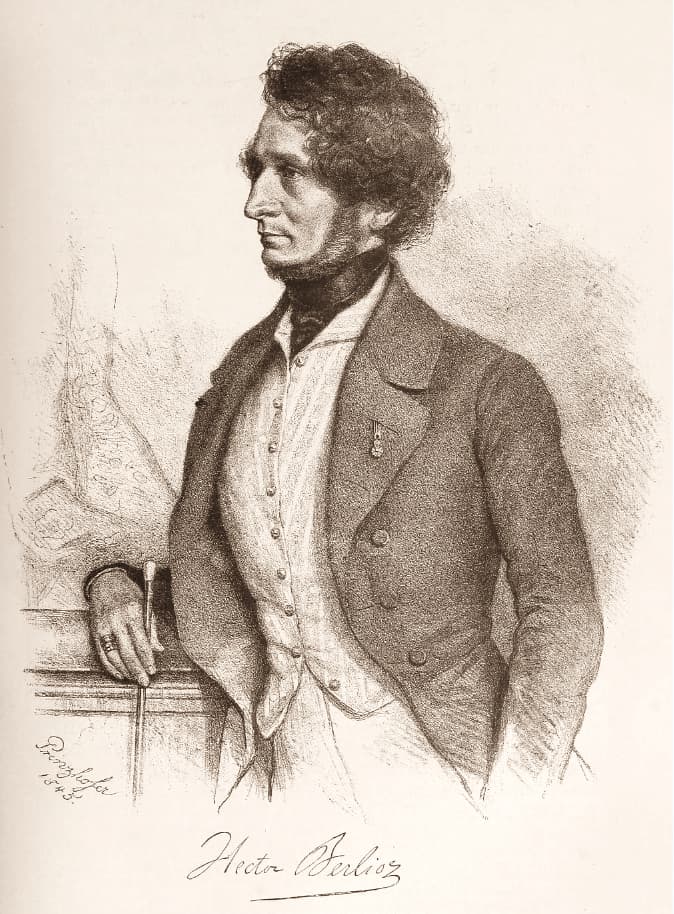
August Prinzhofer: Hector Berlioz, 1845
With Beethoven having his say, let’s conclude with a famous quote about Rossini by the composer and conductor Hector Berlioz. Berlioz writes, “Rossini was the greatest of composers because he understood the essence of opera, that is, the pleasure of the public.”
This insightful observation highlights Rossini’s genius in crafting music that resonated with audiences, effortlessly blending beauty, drama, and accessibility. His operas were beloved not only for their intellectual and artistic merit but also for their ability to entertain and captivate listeners.
Both Rossini’s own quotations and Berlioz’s praise underscore a shared understanding of the composer’s gift and a remarkable ability to create music that is both brilliant and widely enjoyed. Rossini’s work laid the groundwork for later composers who built upon his operatic style. As the musicologist Joseph Kerman wrote, “Rossini’s blend of musical complexity with popular appeal continues to attract both new listeners and long-time fans alike.”
For more of the best in classical music, sign up for our E-Newsletter

